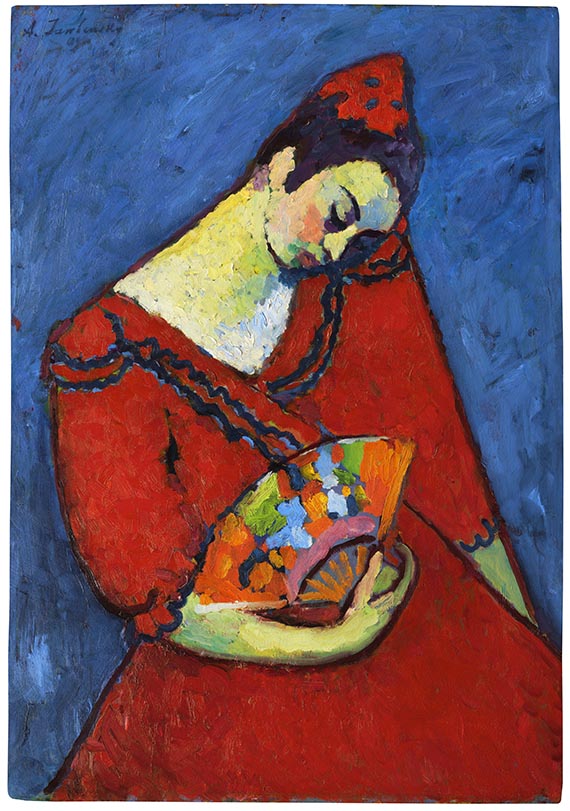Dictionary


The Blauer Reiter
The Expressionist group called "Der Blaue Reiter" [The Blue Rider] was co-founded by the painters Wassily Kandinsky and Franz Marc in Munich in 1911. Other artists who joined Der Blaue Reiter were August Macke, Alexei von Jawlensky, Marianne von Werefkin, Gabriele Münter and Paul Klee, who shared an interest in medieval and vernacular art as well as the contemporary movements of "Fauvism" and "Cubism". The Blauer Reiter group particularly Kandinsky's work as well as his theoretical writings on art ("Über das Geistige in der Kunst" [translated into English as "The Art of Spiritual Harmony"], 1912, etc). August Macke and Franz Marc also advocated the view that every person had an inner and an external reality of experience, which were to be united by art. The name of the group, "Der Blaue Reiter" came from a 1903 painting by Kandinsky of that title. It was used in 1912 to illustrate the cover of the Blauer Reiter Almanac, which Marc and Kandinsky had published by Piper Verlag in Munich. In it Marc wrote: "... the newest movement of painters in France, Germany and Russia shows its fine threads linking it with Gothic art and the primitives, with Africa and the great Orient, with folk art and children's art which are so expressive and original, especially with the most modern musical movement in Europe and the new ideas of the stage of our time." The first of the two momentous Blauer Reiter exhibitions was mounted by Galerie Thannhauser in Munich (18 December 1911 to 1 January 1912). At it forty-nine works were shown by Henri Rousseau, Albert Bloch, Heinrich Campendonk, Robert Delaunay, Wassily Kandinsky, August Macke and Gabriele Münter and the exhibition then toured to Cologne, Berlin and other cities. The second exhibition was organised by the Munich bookseller and art dealer Hans Goltz (12 February to 18 March 1912). It comprised three hundred and fifteen watercolors, drawings and prints by more than thirty artists who either belonged to Der Blaue Reiter or were close to it. Der Blaue Reiter was disbanded in 1914 when the first world war broke out.
The Expressionist group called "Der Blaue Reiter" [The Blue Rider] was co-founded by the painters Wassily Kandinsky and Franz Marc in Munich in 1911. Other artists who joined Der Blaue Reiter were August Macke, Alexei von Jawlensky, Marianne von Werefkin, Gabriele Münter and Paul Klee, who shared an interest in medieval and vernacular art as well as the contemporary movements of "Fauvism" and "Cubism". The Blauer Reiter group particularly Kandinsky's work as well as his theoretical writings on art ("Über das Geistige in der Kunst" [translated into English as "The Art of Spiritual Harmony"], 1912, etc). August Macke and Franz Marc also advocated the view that every person had an inner and an external reality of experience, which were to be united by art. The name of the group, "Der Blaue Reiter" came from a 1903 painting by Kandinsky of that title. It was used in 1912 to illustrate the cover of the Blauer Reiter Almanac, which Marc and Kandinsky had published by Piper Verlag in Munich. In it Marc wrote: "... the newest movement of painters in France, Germany and Russia shows its fine threads linking it with Gothic art and the primitives, with Africa and the great Orient, with folk art and children's art which are so expressive and original, especially with the most modern musical movement in Europe and the new ideas of the stage of our time." The first of the two momentous Blauer Reiter exhibitions was mounted by Galerie Thannhauser in Munich (18 December 1911 to 1 January 1912). At it forty-nine works were shown by Henri Rousseau, Albert Bloch, Heinrich Campendonk, Robert Delaunay, Wassily Kandinsky, August Macke and Gabriele Münter and the exhibition then toured to Cologne, Berlin and other cities. The second exhibition was organised by the Munich bookseller and art dealer Hans Goltz (12 February to 18 March 1912). It comprised three hundred and fifteen watercolors, drawings and prints by more than thirty artists who either belonged to Der Blaue Reiter or were close to it. Der Blaue Reiter was disbanded in 1914 when the first world war broke out.
Offers for Expressionism
Headquarters
Joseph-Wild-Str. 18
81829 Munich
Phone: +49 89 55 244-0
Fax: +49 89 55 244-177
info@kettererkunst.de
Louisa von Saucken / Undine Schleifer
Holstenwall 5
20355 Hamburg
Phone: +49 40 37 49 61-0
Fax: +49 40 37 49 61-66
infohamburg@kettererkunst.de
Dr. Simone Wiechers / Nane Schlage
Fasanenstr. 70
10719 Berlin
Phone: +49 30 88 67 53-63
Fax: +49 30 88 67 56-43
infoberlin@kettererkunst.de
Cordula Lichtenberg
Gertrudenstraße 24-28
50667 Cologne
Phone: +49 221 510 908-15
infokoeln@kettererkunst.de
Hessen
Rhineland-Palatinate
Miriam Heß
Phone: +49 62 21 58 80-038
Fax: +49 62 21 58 80-595
infoheidelberg@kettererkunst.de
We will inform you in time.




